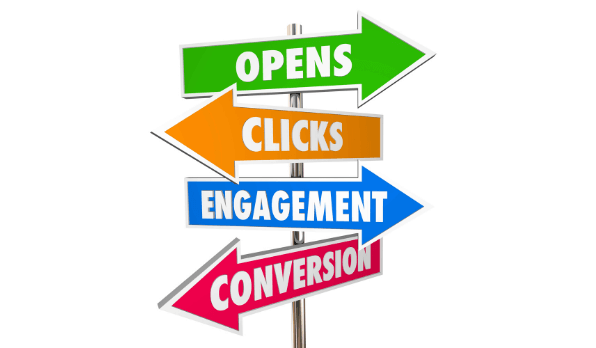Ever thought of measuring your Email Marketing success?
If yes, then do you know all the essential email marketing metrics & KPIs?
Well, the most common metric turns out to be Email Open Rates.
“Open Rates should not be considered the ultimate metric to track for your Email Marketing Campaigns“
Now, hear me out before the Email Marketing fanatics among you come around with pitchforks citing blasphemy. I am not advocating a complete ignorance of Open rates for your Email Campaigns but trying to check on other metrics as well depending on what is important for success among your business objectives.
I was recently talking to a Marketer of a popular fashion outlet. He was not satisfied with their Email Program as it was not getting a sufficient amount of transactions on a monthly basis. On asking the Marketer on what basis was he monitoring the success of their Email Program, pat came the reply ‘Engagement’.
The conversation went on as below:
Me: But what are the engagement metrics for your campaigns?
Marketer: 25% Open rates for our emails with excellent domain health.
Me: What is the CTR rate?
Marketer: Umm…It’s around 0.4%
Me: So there is the problem. If your campaigns are not getting clicked and the users don’t visit your website, how do you expect transactions to grow?
Marketer : *Static silence*
This is I believe where Marketers need to tweak their mindsets a little to see the other metrics for success and in turn, change the way they look at their Email Program as a whole.
In this instance, the Marketer needs to look at improving their clicks by designing better offers and creative campaigns to lure their customers to visit their website and buy their products. Now this can be done via automation programs as well as segmented targeting via Broadcast.
In this article, I have provided some reasons why Open rates shouldn’t be the only metric you should be monitoring for determining the success of your Email Program. We shall also be providing some analysis on what high CTOR (Click-Through-Open-Rates) and low CTOR campaigns mean for your program and why you should aim to increase them to get a better ROI for your Email investments.
1. Not An Accurate Presentation Of Campaign Performance:
If you are a major fashion brand and you targeted your most active Email openers and clickers for last month for your latest Sale campaign.
The open rates are around 25% and more but the click and click-to-opens ratio is less than 1%.
Does that mean your campaign has performed well? Of course, in terms of engagement jargon and maintaining your domain hygiene for ISPs, it has performed brilliantly.
But what are the number of online orders that you have received from this campaign? Probably on the lower end due to the low number of clicks on it.
So now asking the same question, was this campaign really successful?
No, it was an average day for your ROI. What we have to understand is that highly targeted campaigns to your most active base will provide higher than the usual number of opens but the other metrics also need to be analyzed by the Marketer to provide clarity on the performance of the campaign.
The intent of the Email campaign is that your customers should transact with your brand or at least check out your products and build a brand affinity with them. So balance your analysis based on not only open rates but also on clicks for your ROI/Conversions.
2. What Does Email Success Mean To You?
Seriously, write this down.
What are you expecting from your Email campaigns that will contribute to your brand in a positive way?
In short, what are the numbers you are looking for behind that winning feeling?
In some cases, the number of opens is looked at as secondary details by us Deliverability Engineers. We work with a fair number of clients across industries and some brands are more interested in the number of subscribers they are gaining or new leads they are generating because of the Email campaign.
This is especially true for the Insurance and Gaming Industry. If for a campaign by an Insurance company for their dropped off leads, the engagement generated is above average for opens and clicks. But the number of leads getting converted is lesser than expected. The Marketer, in this case, will be trying out ways to personalize and segment their campaign to gain more customers. They will not be content with just getting more “ Engagement “.
Some brands might need to increase subscribers as a KPI and others less so. Thus success in your business objectives will vary according to the industry, therefore, you as a Marketer have to decide what really matters to you in terms of the larger picture.

3. There Are Other Metrics For Analysing Campaign Performance:
Namely clicks and CTOR to start with. These should provide you with more information on your audience behavior and help you plan better campaigns for them.
The bounce and unsubscribes are equally important , which tell us the number of ids which got soft or hard bounced and which are invalid. The unsubscribe rate if high needs to be looked at for reasons by a Marketer to understand why users are unsubscribing to the mailing lists.
Thus it would be short-sighted for anyone to just look at opens and compare campaign performances.
4. The Conversions Vs Opens Pandemonium:
We deal with a lot of online brands whose major chunk of revenue depends on their Email Marketing Program.
We work with such brands to help them increase their conversion rate. In such cases, Opens are secondary to clicks and the number of sessions the website gets for their transactions. In such scenarios, the Marketer will be looking at getting the most clicks from their users and getting them interested via campaign content to entice a transaction.
We have had brands come into us exasperated about not getting enough orders despite their “Open Rates” being sky-high. Here the trick is to improve on the metrics that will eventually get them to their goals and achieve business targets.
5. More Emails Sent To Rest Of The Mailing List Equates More Opens
According to Dela Quist, an Email Influencer – sending batch and blast emails to a major chunk of your lists has led to a higher open rate. So a small increase in your opens for a targeted campaign will mean less business as compared to an increase in your batch and blast opens, which means more subscribers engaging with your brand which includes your inactive subscribers.
So in a way just looking at the higher open rate for a targeted campaign will be detrimental to your business objective as the key should be to getting a higher open rate and thus more ROI for reaching out to maximum subscribers from your mailing list.
Comparison of campaigns with CTORs
So we looked at a few campaigns that we have sent for the brands we cater to, and we can see the difference in their metrics, but what do they tell us about their success?


The above campaign has an Open Rate of 15% plus and an equally good CTOR rate of 10% to match. That means 10% of the 16k users who opened the mail clicked on it and that created 1800 web sessions for the client. Out of those sessions, if even 10% of the users transacted, that’s still 180 orders in a day!


In this instance, the campaign has generated a good open rate but very low on clicks and hence will not generate the web traffic the brand intends from the audience. In this case, the antidote will be to have a better offer for the campaign and some good design work need to be done on the HTML to make it more attractive and engaging to the subscribers. But as such this campaign was a bit of a dud!
We now clearly see that if we adjust our mindsets to look at other metrics for engagement we quickly see a change in the business goals we are aiming for!
Now, on the other hand, there are some brands within the BFSI industry that have an objective to just keep their audience engaged via weekly/monthly newsletters and I think here the opens will a fair metric to measure your campaign success.
Parting Thoughts
With the reasons stated above, We would strongly vouch for considering the other metrics for Engagement rather than just Open Rates if you are a Marketer. This is essential for a brand that depends on conversions, orders, or the growth of your customer base. A slight increase in reaching out to the rest of the users via Batch and Blast will add a significant amount to your ROI as well, as that means you are reaching out to a wider audience.
 Growth, decoded: Agentic Marketing Predictions 2026 for consumer markets. Read the report now.
Growth, decoded: Agentic Marketing Predictions 2026 for consumer markets. Read the report now. 









